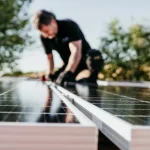Take sunny advantages
Purchase solar panels
Instant savings with your own solar panels. It’s possible.
The purchase of solar panels still remains interesting, especially if you can also take advantage of a premium on solar panels. Unfortunately, this is no longer always the case. Despite this, solar panels even yield higher returns than if you keep your money in a savings account. And that is good news. Because it means even more people are making the switch to solar energy. More than 450,000 UK households have already had solar panels installed on their roofs. Every month, they save a lot of money, live more sustainably, and can look forward to a bright future. Why wait any longer? Invest in the sun today.
Why purchase solar panels?
Once you invest in solar panels, you will immediately start saving on your monthly costs. As energy prices continue to rise, you will pay nothing for power. As an example: with 10 solar panels, you can save an average of £ 600 per year.
Of course, the price of your solar panel system depends on the type and power of the solar panels as well as the inverter. Would you like to know exactly what your solar panels will cost? You can calculate the price in less than a minute and find out what you will save by using solar energy.
Sustainable with solar panels
The greenest energy is the energy you generate yourself. Directly from the source and without interference from your energy supplier. This way, you can dramatically reduce CO₂ emissions. To give you an idea: the CO₂ emissions you save thanks to solar panels are equivalent to the emissions of over 600,000 km of driving. That’s definitely worth it.
Increase your home's value
Indirect profit from solar panels
An investment in solar panels indirectly leads to an increase in the value of your home. A win–win situation. Buyers are usually willing to pay more for a property if there are solar panels on the roof. The is logical because the potential owner realises that their energy bills will be lower from day one. Moreover, since 1 January 2017, the energy performance certificate (EPC) has been mandatory when buying, selling, or renting a property. At Soly, we think so too!
How do solar panels work?
In the orientation phase prior to purchasing solar panels, you will likely want to receive as much information as possible. We fully understand that. When investing in solar panels, you will have to deal with terms such as kWh and payback time as well as parallel and serial connection. These terms are important to understand. After all, what matters is the bottom line. How big an investment should I make? How much will I save? And within what time frame will I reach the break-even point between investment and yield from solar panels? The answers to these questions depend on numerous factors. How do solar panels work?
Each solar panel consists of many solar cells. These solar cells are made of silicon, a metalloid. Solar cells absorb photons (i.e. elementary particles from sunlight) and transform them into electrons. When sunlight hits the solar panel, a current develops in the solar cell. This is converted into direct current. This process is referred to as the photovoltaic or photoelectric effect. A voltage field is created between the surface of the solar panels and the underside (positive and negative), thereby causing the panels to generate direct current. The direct current generated in the process is then converted into usable alternating current by the inverter.
Purchasing solar panels
The cost of solar panels consists of complete installation of the solar panels, inverter(s), roof assembly, and cabling. Among other things, we take into account the type of roof (pitched/flat), the angle of inclination, the number of solar panels, and the inverter type. There is therefore no fixed price associated with solar panels. Would you like to calculate the price for solar panels? We can tell you more about that with no obligation. Based on your own specific situation – and taking into account the solar panel premium – we will provide you with both an indication of costs and the potential yield from the solar panels.
Payback period for solar panels
You will generate at least 3,400 kWh of electricity per year with this installation. Based on current energy prices, you will save around £700 annually. In the United Kingdom, you also have to deal with injection rates. These vary from one energy supplier to another and thus affect the payback period of solar panels. On average, the payback period for solar panels in the United Kingdom is around seven to eight years.
Note that the average energy price has been increasing. As a result, the energy price given may differ.
Knowledge base


